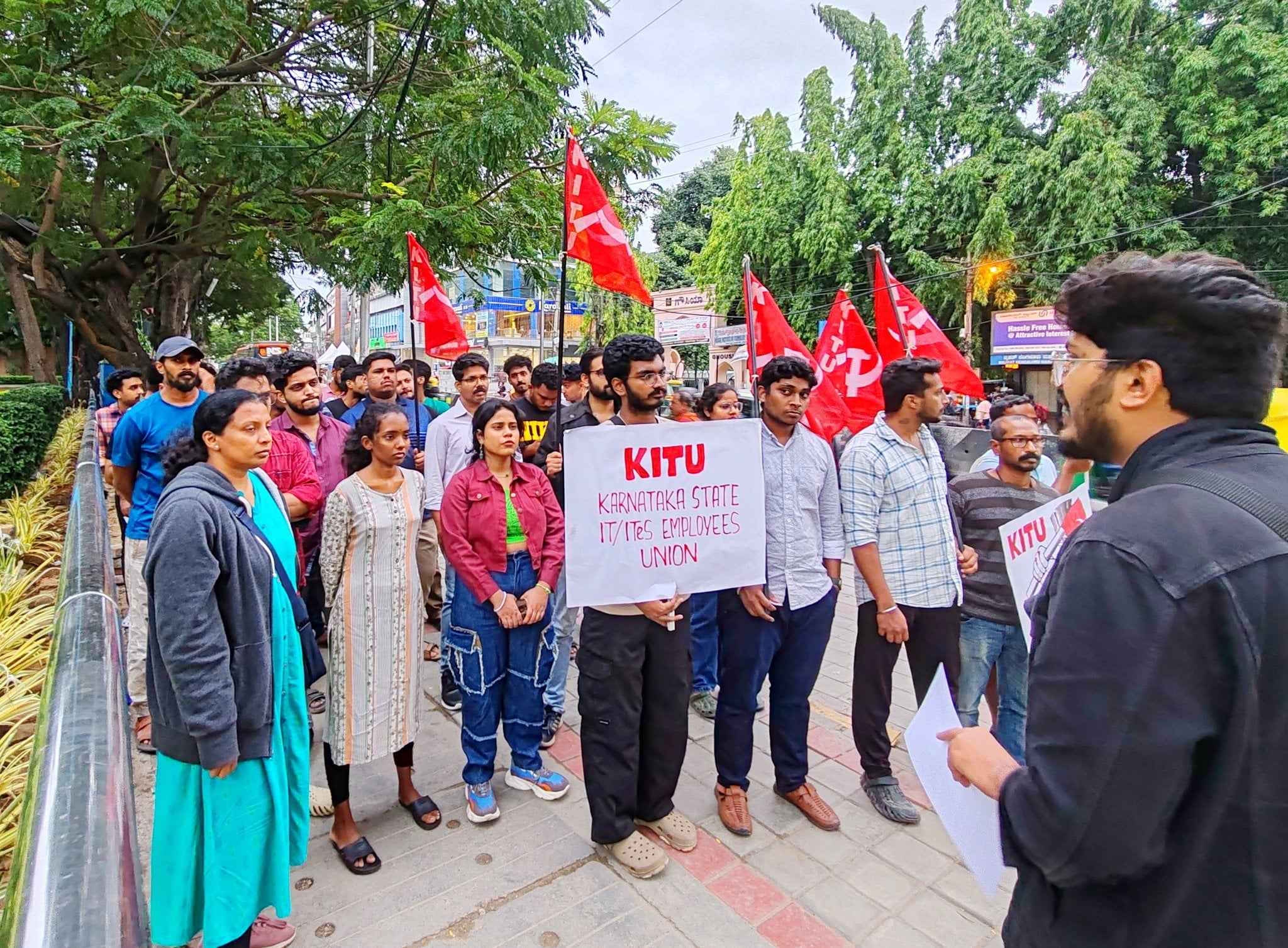The fundamental roadmap of labour rights does not permit extending working hours in any sector, but recent proposal of the Karnataka government to elongate working hours for IT employees in order to fight financial hazards and boost ‘growth’ does not match the human-right frameworks. In July, state labour minister Santosh Lad presented the controversial ‘Karnataka Shops and Commercial Establishments (Amendment) Bill, 2024′ that intends to eradicate limits on the standard measures and to stretch the 8-10-hour work day into a ’14-hours-a-day’ that would include 12 hours of work and 2 hours of breaks/overtime.
Employees’ unions and women’s rights organisations have openly criticised the proposal, meanwhile, the IT professionals embarked on full-fledged protests.
Employees’ unions and women’s rights organisations have openly criticised the proposal, meanwhile, the IT professionals embarked on full-fledged protests. A mammoth horde of employees from the IT and ITES amassed in the freedom park of Bangalore to oppose this new outline, on the other hand the feminist clusters have been raising their voices to slam its negative impact on the women workforce. The general secretary of KITU (Karnataka State IT/ITeS Union), Suhas Adiga has underlined it as an ‘inhumane‘ decision that will help the IT companies to exploit their workers. Giving response to the proposal, AIITEU (All India IT & ITeS Employees’ Union) has demanded to limit the working hours and fix a minimum wage of Rs. 26,000 to ensure justice and to safeguard the human rights.
In a period when several organisations in developed countries like Australia, Austria, Denmark, France and Germany are boosting productivity with a 4-day work week (32-hours-a week), this proposal to gobble the rights of employees to beef-up alleged ‘productivity-rate’ can actually harm the efficiency of work and disrupt the peace and growth of a sector.
Karnataka presents anti-human pleas: the corporate Idea of productivity is feudal and colonial
Back in 2023, Karnataka and Tamil Nadu were slammed for attempting to amend the ‘Factory Act Of 1948’ to attain legal permission for 12-hour work day. The governmental pleas are still trying to interpret their endeavours as a ‘tricky policy’ that will reinforce the Indian economy on the Chinese model. It’s noteworthy that the infamous ‘Foxconn theory’ of china signifies workers as useless and ‘interchangeable’ machine-parts who need external pressures and a leader to work mechanically for the benefit of country.
In January, 2024, NR Narayana Murthy, the Infosys co-founder also incited a massive hubbub by advising youngsters to work 70-hours per week. The ’14 hours a day’ in a ‘five-day working week’ also demands 70-hours on a weekly basis and can be perceived as a conspiracy theory of purchasing and mishandling cheap-labour from developing countries for capitalistic gain in the name of development.
The 14-hour work day is against humanitarian morals and an offense to the hallmarks of historic and worldwide struggles of the working class that evolved the concept of ‘888’; 8 hours for work, 8 hours for personal goals (recreation) and 8 hours for rest. This idea was first applied by the US Congress in 1868 and then leader and reformer Dr. BR Ambedkar brought this to India.
In January, 2024, NR Narayana Murthy, the Infosys co-founder also incited a massive hubbub by advising youngsters to work 70-hours per week.
Seeing humans as an ‘instrument’ and snatching their personal space is a mark of fascist, feudal and colonial inclination. However, the scheme is destructive to every employee of the IT sector but women who are already perceived as an ‘object’ by our patriarchal society can face utmost discrimination and brutal negative aftermaths, because due to unjustified gendered polarisation of domestic duties and in-house liabilities, the work-life balance becomes a ‘decisive scale’ for them.
Addressing the protestors in the freedom park on August 5, comrade Rashmi Choudhary, the vice president of KITU said – ‘8-hour work days are not given for free. Our workers fought for their rights. Our workers died for their rights. Through their blood, soil and sacrifice we got this basic protection.‘ Pointing towards PM Narendra Modi, she said- ‘The capitalists want us to believe that we don’t deserve the rest and we don’t deserve a life outside the work.’
Long work hours can increase the exploitation of women workforce
According to the Indian labour laws, 8 hours a day and 48 hours a week are considered standard. ‘The Factories Act 1948’, and the ‘Shop & Establishments Acts Of states’ allow 10-hour workday with work and intervals.
A study of CFA Institute reveals that the IT sector had a 30% female representation during 2021-22 which is a way more than the average female participation in the other mainstream jobs. Meanwhile, In comparison to men women are also 10 times more indulged into domestic errands and caregiving. They spend more time on in-house duties, consequently such long working hours may mess-up their everyday schedules and snatch better work-opportunities.
14-hour work days can also be unbearable during menstruation due to period-pain and cramps. This proposal of the Karnataka government aims to replace the current 3-shift system with a 2-shift system, resulting in horrible work-pressures and zero time for self-care.
14-hour work days can also be unbearable during menstruation due to period-pain and cramps.
Indirectly, this will also limit women to the boundaries of home with excessive responsibilities because male members would not be able to participate in in-house chores after an exhausting day. Apart from this, working women won’t find required leisure to pursue other aspirations or humble personal goals.
Inhumanely long work hours are not a right way to fight financial challenges
Behind such arbitrary governmental proposals to combat the poverty rate and unemployment, there are deep-seated imprints of British imperialism that economically exploited the Indian citizens for professional profit. In British India, the educational system and companies were designed to manufacture educated slaves. But now, as free citizens of a sovereign nation, we need to oppose such terrains.
An exhausted mind can’t produce good ideas and no sector can develop without fresh ideas and a democratic atmosphere. Women deserve equal pay and men are required to contribute equally in the household errands. Wellbeing of the employees is the best method to unleash and utilise their utmost potential without disturbing their personal life, boundaries and ‘me-time’.
According to the Household Consumption Expenditure Survey of 2024, 33.8% of Indian population spends only 100 rupees a day to survive. The presented 14-hour work day will only enlarge these economic gaps and close the possibilities for most of the women who are tied through domestic responsibilities. Less participation of women would also be a big damage to the progress and financial targets of a company. It would not eradicate employment, poverty and lack of resources but boost-up the current hazards through arbitrary, unequal, unfair and cruel treatment.
It’s also not good from the health viewpoints. Around 55 hours per week or more can cause serious health hazards. The International Labour organisation along with WHO scrutinised 3,47, 000 cases of heart-diseases in 2016 that were a direct result of working for more than 55 hours. Lack of adequate sleep can also affect the physical and mental health of people through mild or hard outbursts of anxieties and other ailments.
Precisely, as the slogan declares, IT employees are ‘not slaves and their voices must be heard.‘ It’s a good sign that women are actively participating in the ongoing protests to raise slogans against capricious proposal of the Karnataka government. Workers are often exploited in India due to lax labour rules. We already require more clarity in the present-day labour laws to safeguard rights and the 14-hour work day can only worsen the situation.
About the author(s)
Mariyam (she/her) has a thirst for journalistic and creative stories that consist of feminist, humanitarian, contemporary or artsy themes. She hails from a Political Science, English Literature academic background and an Urdu-Hindi crux.
For her, words are a visionary sovereignty to stand on and find the meaning of being while journalism is the only place where truth comes with utmost clarity, facts and data. When not weaving pointy narratives or poetic expressions, she loves mingling with cats or delving into photography, cinema, music, daydreaming and stargazing.








